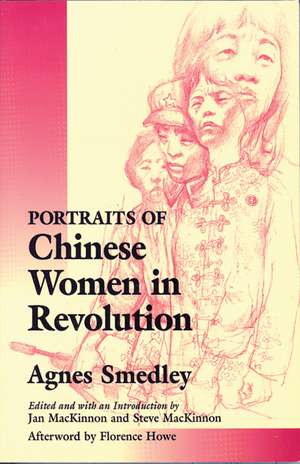Portraits of Chinese Women in Revolution
Autor Agnes Smedley Editat de Jan MacKinnon, Steve MacKinnon Cuvânt după de Florence Hoween Limba Engleză Paperback – 31 oct 1993
Agnes Smedley, author of Daughter of Earth, worked in and wrote about China from 1928 to 1941. These 18 pieces—all out of print and most unavailable even in public libraries—are based on interviews with revolutionary women. They include descriptions of the massacre of feminists in the Canton commune, of the silk workers of Canton whose solidarity earns them the charge of lesbianism, and of Mother Tsai, a 60-year-old peasant who leads village women in smashing an opium den.
Preț: 62.76 lei
Preț vechi: 77.25 lei
-19% Nou
Puncte Express: 94
Preț estimativ în valută:
12.01€ • 12.54$ • 10.07£
12.01€ • 12.54$ • 10.07£
Carte indisponibilă temporar
Doresc să fiu notificat când acest titlu va fi disponibil:
Se trimite...
Preluare comenzi: 021 569.72.76
Specificații
ISBN-13: 9780912670447
ISBN-10: 0912670444
Pagini: 208
Ilustrații: 11 B&W photographs
Dimensiuni: 140 x 216 x 15 mm
Greutate: 0.45 kg
Editura: The Feminist Press at CUNY
Colecția The Feminist Press at CUNY
ISBN-10: 0912670444
Pagini: 208
Ilustrații: 11 B&W photographs
Dimensiuni: 140 x 216 x 15 mm
Greutate: 0.45 kg
Editura: The Feminist Press at CUNY
Colecția The Feminist Press at CUNY
Recenzii
"Smedley was not primarily a facts-and-figures journalist. Her instincts were those of a storyteller and a moralist, but at the same time she resisted the bland mechanisms of Socialist realism. Character, not ideology, was her touchstone, and many of these vignettes have a folk-tale quality, with heroines stepping forth to tell their own stories in the first person. . . . Along with Daughter of Earth, Portraits remains the only readily available introduction to the work of this most remarkable woman." —The Nation
"The pieces in Portraits were all written in the 1930s . . . by a working journalist who wanted passionately to make her fellow Westerners 'see' the harsh meaning of Chinese lives, and the promise the revolution held out for those lives. What the pieces as a whole accomplish is exactly that: through these women's lives we see vividly the flux and turmoil, the despair and exaltation of China. Above all, what Smedley has captured brilliantly—and this is most important—are the forces of the old and new China struggling in each person she describes." —The Village Voice
“A record of experience so authentic, so intense, that it burns itself into the mind of the reader, leaving him/her with a sense of wonder at the enduring quality of the human fabric, and with a deep resentment at human cruelty and injustice.” —The New Republic
"The pieces in Portraits were all written in the 1930s . . . by a working journalist who wanted passionately to make her fellow Westerners 'see' the harsh meaning of Chinese lives, and the promise the revolution held out for those lives. What the pieces as a whole accomplish is exactly that: through these women's lives we see vividly the flux and turmoil, the despair and exaltation of China. Above all, what Smedley has captured brilliantly—and this is most important—are the forces of the old and new China struggling in each person she describes." —The Village Voice
“A record of experience so authentic, so intense, that it burns itself into the mind of the reader, leaving him/her with a sense of wonder at the enduring quality of the human fabric, and with a deep resentment at human cruelty and injustice.” —The New Republic
Notă biografică
Agnes Smedley (1892 – 1950) was an American journalist and writer, well known for her semi-autobiographical novel Daughter of Earth as well as for her sympathetic chronicling of the Communist forces in the Chinese Civil War. During World War I, she worked in the United States for the independence of India from the United Kingdom, receiving financial support from the government of Germany. Subsequently, she went to China, where she is suspected of acting as a spy for the Comintern. As the lover of Soviet super spy Richard Sorge in Shanghai in the early 1930s, she helped get him established for his final and greatest work as spymaster in Tokyo. She also worked on behalf of various causes including women's rights, birth control, and children's welfare. Smedley wrote six books, including a novel, reportage, and a biography of the Chinese general Zhu De, reported for newspapers such as New York Call, Frankfurter Zeitung, and Manchester Guardian, and wrote for periodicals such as the Modern Review, New Masses, Asia, New Republic, and The Nation.
